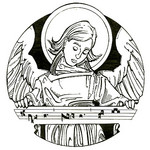Dear Supporter of Sacred Music,
We would like to tell you of a wonderful emergency that we are facing. From all over this country, we have been flooded with registrations for two programs: the annual Sacred Music Colloquium and the Chant Intensive. Both are held at Loyola University in Chicago in June 2008.
I am an instructor at both, and I can’t wait!
We are facing unprecedented demand, and the reason is clear. Gregorian chant in our Catholic parishes is making a huge comeback. People all across this country—and around the world—are working hard to learn to sing it and make it part of our Catholic lives again.
This is a moment that many of us have waited for and work for, for decades. The Church has given us such beautiful music to go with the Mass. It is an answer to prayer that there is now intense interest in hearing this music not just on CDs but in our own parishes, as an essential part of our liturgy.
What is the emergency?
We have received many messages from young music students, young music directors, young priests, and seminarians that they cannot afford the full cost of the program. Now, as a non-profit organization on a shoe-string budget, we have made the price as low as we possibly can. Many of these people will have to decline to attend if they cannot find the money.
Why does this matter? Because this is the future of music in your parish at stake.
The people who train at these programs come back and immediately start using what they have learned. They train others in their parishes. The movement catches fire. People’s spiritual lives are renewed. Most important, the music that is uniquely appropriate for Mass (it should have “pride of place,” said the Second Vatican Council) is again heard at Mass where it belongs.
Have you heard Gregorian chant at Mass? If so, you know what it can mean. It is the sound of the faith, even old and ever new. It is sung prayer. It has a quality that meets the very definition of sacred music. Popes from all ages have taught this. Benedict XVI has reinforced this many times in his sermons and writing. But it doesn’t require an encyclical to make the point. It is there in the hearing.
Think about what chant would mean in your parish. It can make a huge difference in the way the faith is presented. Instead of tunes drawn from popular culture, chant is rooted in our history like not other music. When we sing it, we are singing the music of the saints and martyrs.
Given the state of Catholic music today, many people think there is little hope. The truth is otherwise. What is missing are people with the training necessary to take the step. They need to know how to chant the music, pronounce the Latin, handle the phrasing, and integrate it with the liturgy so that we don’t just sing at Mass; we sing the Mass itself.
Some of those waiting for scholarships are young priests and seminarians. Others are young music students who are considering vocations. They will return to parishes and schools with a burning passion for chant. They will be an essential part of a bright future.
And not just chant: the training we provide encompasses its successor music, polyphony of the Renaissance, which the Second Vatican Council also named as uniquely suitable. That means the music of Palestrina, Byrd, Victoria, and all the great composers of that period.
The causes of the problems in Catholic music are many, but the answer of education has the highest prospect for success. It’s been proven for several years. Most of the new scholas starting out in today’s parishes have formed as a direct result of the programs of the CMAA.
I personally have a strong interest in seeing our scholarship budget grow. I have received messages from these young people, and I so badly want to see them attend. We are on the verge of something truly wonderful. There is opportunity for you to help.
If we don’t receive support, we will have to tell these people (and there are more of them every day) that there are no funds for them. They need to know soon so that they can make their summer plans. I would like to be the bearer of great news!
Would you please consider it? A gift of $1000 would make an enormous difference. Gifts of $250 or even $100 can make a difference. It will permit us to begin to have the means to bring some of these people to our programs and train them to play a special role in the future of Catholic music.
Your help can make the difference. Go to musicasacra.com/donate to make a contribution. Please know of our deep appreciation for your support of this important work.
Sincerely,
Scott Turkington
Stamford Schola Gregoriana
Church Music Association of America

